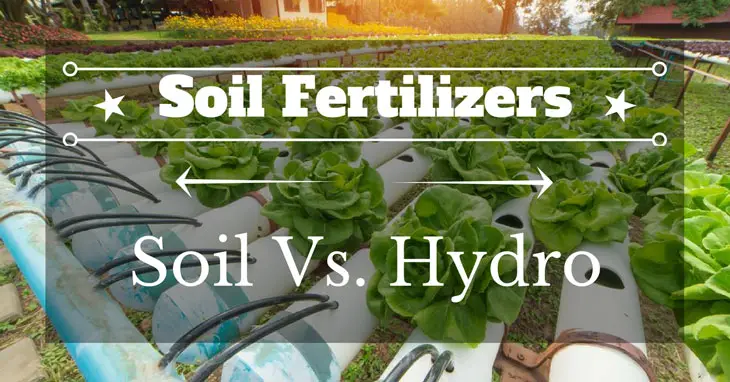Soil vs Hydro: Which is Best for Plants
Many people are asking, which is better between the two: soil vs hydro. Some gardeners prefer a simple gardening style which is planting using soil, while others prefer to invest on hydroponics because of its potential. If you are not sure which one to choose, this article will help answer your question.
More...
Related Post:
Soil vs Hydro - Basics
Before you decide the method of planting to choose, it is important to first differentiate soil vs hydro.
Soil - Garden soil is typically composed of salt, silt and clay as well as a good amount of organic matter. A potting soil, on the other hand, contains a little amount of actual soil particles and more of organic matter with varying amount of vermiculite or perlite and added nutrients. The article The Difference Between Potting Soil and Potting Mix explains more about this.
Hydroponics – Most people would imagine hydroponics as a method of planting where the plants have their roots suspended in water. While this may be correct, this set-up is just one of the many types of hydroponic gardening. You can learn more about the different types of hydroponics in an article published by Growth Technology.
Hydroponic is a method of growing plants in a soilless or aquatic-based environment. It uses nutrient solutions in water so that plants will grow healthy.
Soil Vs Hydro – Which One is Complicated
Soil - Most people are familiar with soil gardening. It involves planting of seeds and growing them in garden soil or a potting mix. If the soil is rich in nutrients and organic matter, you should be able to have a good harvest. Soil gardening involves simple procedures which even newbies can easily follow.
Hydro - Hydroponic gardening may also be as simple as growing a single plant in an inert growing medium which does not involve any automation or electricity. However, if you have the budget and are willing to make it big, you can also automate your hydroponic garden set-up which could include using electricity for water circulation or installing an app that will control the maintenance side of operating your garden. In going automated, only your imagination is the limit.
The most basic hydroponic system which is commonly used by hobbyists requires basic parts including a reservoir, growing trays, a submersible pump for watering the plants, a timer, air stones (to oxygenate nutrient solutions) and an air pump. Artificial or natural lighting is also required.
Soil Vs Hydro - Advantages and Disadvantages
#1 - Space Savings
If you plant directly to the soil in your garden, it will require a big amount of space for the plant’s root to spread out and get nutrients from the soil. However, if you have a greenhouse and grow on pots and in a vertical garden, that is a space saver. The same is true for hydroponic gardening. You can grow more plants in plenty of trays within a limited space because the roots will not need to spread out. Instead, they are confined in a small space and submerged in water with an oxygenated-nutrient solution.
#2 - Water Usage
Typically, gardeners would water their plants every few days. The roots will suck up some of this water while the rest will seep farther into the ground or evaporate out of the soil. In this process, only a small percentage of the water is absorbed by the roots and used by the plant.
In comparison, a hydroponic method uses a system called recirculating nutrient reservoir wherein the roots will only absorb the amount of water they need from the reservoir and then leave the rest for later use. To prevent evaporation, the reservoir is covered most of the time. In this technique, you can save about 90 percent of water you would otherwise use in soil gardening.
#3 - Weeding
Weeds naturally grow in the soil. Even if you use a natural or artificial method to discourage the growth of weeds, they will still come and go from time to time.
With hydroponics, since you are not utilizing soil, there are also no weeds. This also lessens the probability of soil-borne pests and diseases.
#4 - Planting Cycle
Growing plants in the soil outdoors means you’ll depend on the harvest cycles of vegetables you will be planting. It could take several months to grow a plant from seeds to harvesting your produce. With hydroponics, plants grow faster. For instance, it takes two months for a head of lettuce to grow from seeds to harvest if you are planting in soil. With hydroponics, you can already harvest in about a month.
#5 - Control
A hydroponic system gives you control of your plant’s environment. You can plan the nutrient mixture, humidity, temperature and growing schedule of your plants. To a certain degree, you can also control some of these factors if you grow plants in a soil and have a greenhouse though the level of control is still higher with hydroponics.
The only drawback in hydroponics is that it can be hard to figure out at first the perfect environment for a particular plant you are growing. You need to find the right combination of factors I mentioned to harvest plenty.
Soil vs Hydro – Making a Choice
The conventional way of gardening which is planting in soil is still popular to many gardeners. Despite the many advantages of hydro over soil, many are still comfortable with using soil as a medium. I also personally prefer planting in soil, but I am not closing my doors to hydroponics. It is a relatively new and more advanced technique of planting which offers a wide range of benefits.
Conclusion
Hydroponics has many advantages in terms of saving space, water and time. It also gives you more control of the conditions that affect the growth of your plants. However, if you want a hydroponics garden that is sustainable, you need to invest in several basic equipment. Setting up the whole system may also require the assistance of someone who is experienced in the process. This is unlike planting in soil which just needs basic gardening tools and simple planting procedure. You need to weigh the pros and cons of soil and hydro gardening before deciding.
Which one do you prefer, soil or hydro? Please share with us your thoughts through our comment section. Please feel free as well to share this article to others.

